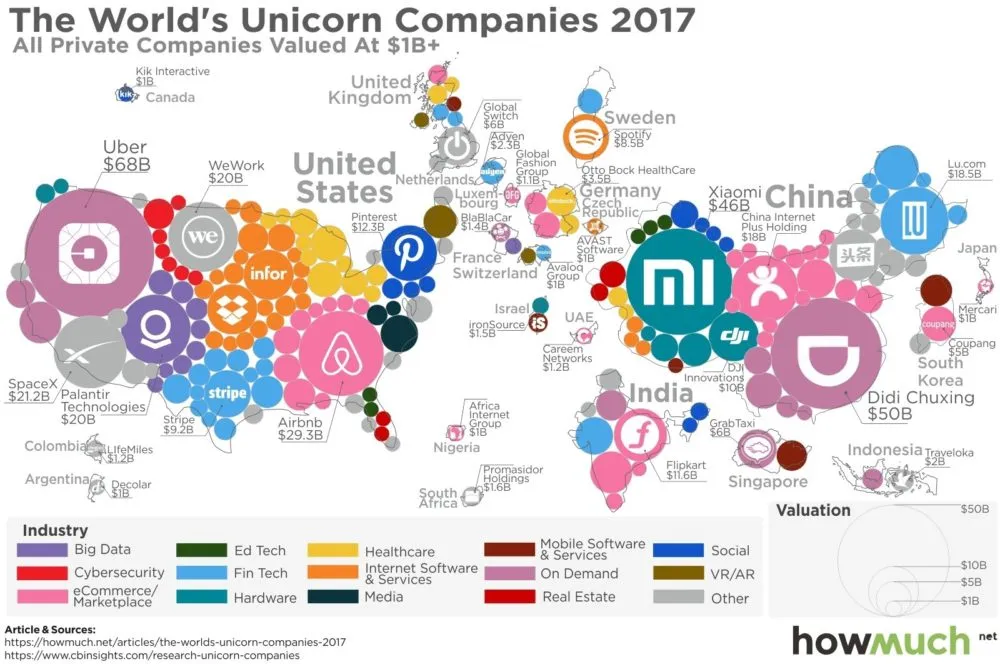Do you know what a unicorn is? Of course you do. It’s a magical creature of mystery and fiction that likely doesn’t exist. In business terms, a Unicorn is basically the same creature of mystery: A privately held startup that reaches a valuation of $1-billion. There are about 200+ of them out there and all across the globe, founders are raising ungodly amounts of capital to be part of the unicorn club at any cost.

I am not a fan of the unicorn club or the concept of a business unicorn in general. I have tried to build this kind of business in South Africa and it’s extremely difficult for a variety of reasons. In general, unicorn startups have proven themselves to be negatively disruptive, toxic and self-serving enterprises that make very few people a ton of money while damaging society in their wake. I do believe that some unicorns (like SpaceX, Stripe, and Spotify), do more good than bad, but they are the exception, not the rule.
If you don’t believe me, let’s take a look at some of the companies that proudly wear the unicorn badge:
Facebook — used to manipulate elections, track users and invade privacy at every possible turn.
Uber — knowingly ignored laws to launch its service in key markets globally. Under fire for toxic workplace practices and stock price completely cratered after its Initial Public Offering (IPO).
WeWork — late in 2019 was scheduled to go public at a $47-billion valuation. Within weeks, the questionable founder was fired (receiving over $1-billion to leave), and the company was sold off to one of its investors for $8-billion.
Lyft — stock price cratered after IPO and it’s not profitable.
Twitter — unable to manage the trolls, vitriol and abuse from its users on the platform. Used to manipulate the public and spread fake news by organisations such as Bell Pottinger on behalf of the Guptas.
South Africa doesn’t need unicorns. We have enough people spouting lies, destroying society, making magical statements and promoting corruption. Throwing startups into this mix is a recipe for further economic disaster.

(Photo: Unsplash / Thomas Bjornstad)
I prefer the zebra startup. What South Africa needs is something we are already very familiar with. We need zebras. We know zebras. We like zebras. They are real, tangible and glorious creatures to protect and nurture.
In March 2020, I am attending a conference for the founders of zebra startups. The term was coined back in 2017 by Jennifer Brandel, Mara Zepeda, Astrid Scholz and Aniyia Williams, who are the founding directors of Zebras Unite in an article they published which explained why they chose the zebra and what a zebra startup is.
They wrote: “We believe that developing alternative business models to the startup status quo has become a central moral challenge of our time. These alternative models will balance profit and purpose, champion democracy, and put a premium on sharing power and resources. Companies that create a more just and responsible society will hear, help, and heal the customers and communities they serve.”
And here’s why they chose the zebra:
-
To state the obvious: unlike unicorns, zebras are real.
-
Zebra companies are both black and white: they are profitable and improve society. They won’t sacrifice one for the other.
-
Zebras are also mutualistic: by banding together in groups, they protect and preserve one another. Their individual input results in stronger collective output.
-
Zebra companies are built with peerless stamina and capital efficiency, as long as conditions allow them to survive.
So much of this makes sense in a South African context; real businesses that are mutualistic, benefit society, make a profit and are capital efficient.
South African entrepreneurs understand how to be frugal and capital efficient. We understand how to build and grind away every day to eke out value wherever we can. But I have watched over the past decade as we have become enamoured with the Silicon Valley method of building businesses. That method includes raising an extreme amount of money, blowing it quickly on vanity metrics and ignoring profitability or societal impact.
This business model is dead. Unicorns are dead.
Zebras are the future and are easier to build than one might think. Here are a few things to consider if you want to build a zebra business right now in South Africa:
Go out and sell rather than pitch to investors. Selling is the best form of funding.
Be kind to your team and your suppliers. Don’t work them 20 hours a day, pay them a pittance and withhold payment because you can. Pay on time, every time.
Do not strive for success at any cost, it’s not a zero-sum game. I don’t have to lose for you to win. A rising tide lifts all ships and the more we think about business in this context, the more chance we have of saving our dire economic situation for future generations.
Building a zebra startup doesn’t mean building something small. It means building something meaningful, valuable and sustainable. Paul Graham, the founder of one of the most successful startup incubators called YCombinator, has said in the past that to build something big, start by building something small. You don’t need to rush into a billion-dollar valuation for your business. Build something small and valuable, scale it over time and if you happen to hit a billion-dollar valuation, good for you.
We need to shift our victory condition from gaining extreme personal wealth from a startup to the creation of value for society that might lead to personal wealth along the way. BM
Nic is an obsessive entrepreneur, global keynote speaker, and published author. Follow Nic on Twitter, sign up to his newsletter or book him for your next event or conference.















 Become an Insider
Become an Insider